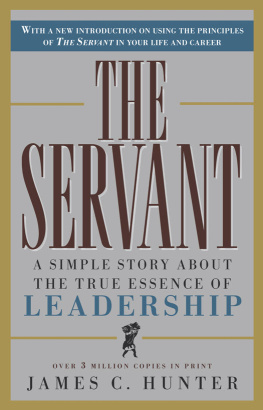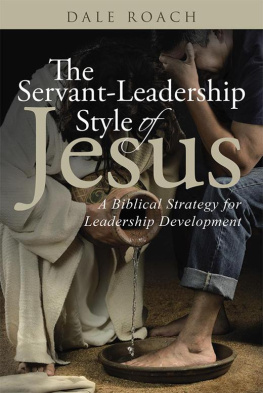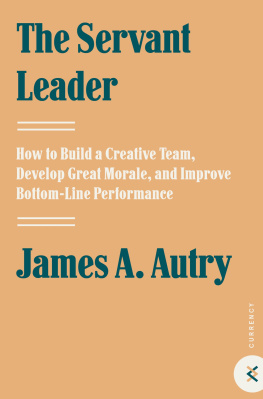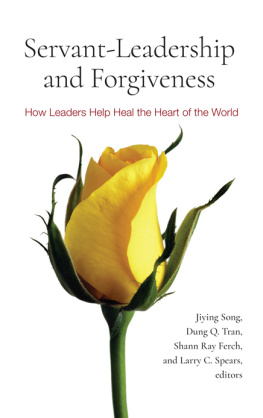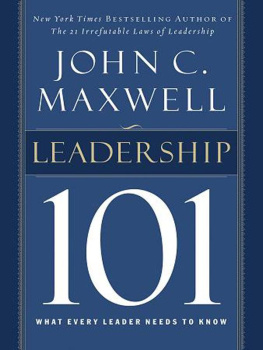Contents
CHAPTER ONE
The Definitions
CHAPTER TWO
The Old Paradigm
CHAPTER THREE
The Model
CHAPTER FOUR
The Verb
CHAPTER FIVE
The Environment
CHAPTER SIX
The Choice
CHAPTER SEVEN
The Payoff
To the Glory of God
Acknowledgments
Of course, this work would not have been possible without the help of a number of people. My heartfelt thanks go out
To my first business mentor, Phil Hoffman, who taught me that being the boss and being a gentleman are not mutually exclusive roles.
To my business associates and clients who have taught me valuable lessons over the years, especially Kevin Alder, Ed Danner, Russ Ebeid, Greg Goodman, Mike Hipsher, Mike Panther, and George Treglown.
To authors Tony Campolo and M. Scott Peck for their skills in articulating some of the great truths of life.
To Debra Venzke and Steve Martin at Prima for their skills and assistance throughout the editing process, and to Paula Munier Lee for her guidance and especially for her vision in recognizing the importance of the theme contained herein.
To Simeon, monk and archabbey librarian, St. Meinrad Monastery, St. Meinrad, Indiana, for sharing the ropes of the monastic life with me.
To my editors and cheerleaders, including Eric Bacon, Phyllis and Jack Hunter (my parents), Karen and Mark Jolley, Pam and Mickey Krieger, Elizabeth Morin, Karen and Bill Rajki, Colleen and Craig Ramquist, John Riley, Patty and Scott Simonson, and especially Theresa and John Vella, whose ideas and encouragement were invaluable to me.
To my precious little girl Rachael (well into her Terrific Twos) who has been a blessing (literally) to me beyond words.
And finally, to my life partner Denise, for her love and commitment (especially when Im difficult to be around) as we journey together on our paths of spiritual growth. I love you, honey.
Introduction to
the 2012 Edition
I have been both surprised and humbled by the impact of The Servant since completing the manuscript some fifteen years ago this month.
At that time, if someone had suggested to me that this simple story would become an international bestseller with better than 3.5 million copies sold, I would have considered asking them if they were taking drugs.
My surprise lies (in part) in the fact that the principles of servant leadership are such basic, commonsense notions, indeed self-evident. I mean, lets be honestthese are not my ideas. These principles have been around for many centuries (everything I write and talk about I stoleIm a thief; I admit it!). Theres nothing new under the sun.
One of the main reasons I wrote the book was that I felt I had found a unique way to frame the material so people could easily understand these simple yet profound truths.
The principles are so basic that I experienced a fair amount of anguish after submitting the manuscript to various publishers for consideration, fearing they might react with, Really? How about telling us something we dont already know.
There have been more surprises.
Prior to writing The Servant, I was a self-employed labor relations consultant working primarily in the secular business world in southeast Michigan, the home of the American labor movement and arguably one of the toughest and most mature labor arenas in the world.
Working and living in that world caused me to debate the inherent hazards of including in a business book themes some would consider namby-pamby and others controversial. These days it can be risky talking about politically incorrect topics like faith, the monastic life, selflessness, humility, meeting the needs of others (even before your own needs), Jesus, and, yes, even love.
I feared if I addressed business audiences and started talking about love, Human Resources people might go into spontaneous human combustion with cries of Mr. Hunter, were trying to get sexual harassment out of the building! What are you talking about love for? I could practically hear them lamenting (along with Tina Turner), Whats love got to do with it?
I mean, lets face itif you write business books or conduct business seminars talking about love and sprinkle a little Jesus in there, it will probably cost you some readers and clients, probably lots of them. I nearly lost my courage and spent weeks debating just keeping things superficial and vanilla so as not to upset or offend (and also to protect my business!).
In the end I made the choice to include those risky themes for one very basic reason. I simply could not be intellectually honest about servant leadership while leaving out concepts like love, humility, and selflessness.
Why? Because the great servant leaders in history talked about those very things. Jesus, Gandhi, Mother Teresa, Martin Luther King Jr. Even sports coaching legends like Vince Lombardi and John Wooden and business icons as diverse as Jack Welch and Max De Pree have spoken often of love. Herb Kelleher, who founded Southwest Airlines on the basic principles of servant leadership, utilized the advertising slogan The airline that love built for many years. Still today, this highly successful airlines New York Stock Exchange ticket symbol is LUV.
So I plowed ahead and wrote this simple story about the true essence of leadership incorporating those very themes. The book just poured out of me and was completed in about six weeks. (For perspective, my second book took me six years to completebook number three is eight years and counting!)
Upon publication in 1998, I was pretty sure that if The Servant was to have any success at all, the primary audience would be faith-based organizations. And if any lecturing and consulting came as a result of the book, I resigned myself to the fact that I would be spending my time in the faith-based world.
Wrong.
One of the great ironies of my life is that I spend 98 percent of my time lecturing and consulting to secular groups including business, military, health-care, educational, and many other profit and nonprofit organizations. Only on rare occasions do I address faith-based groups.
At first I was shocked by this.
I think I now understand it.
The World Is ChangingFast
VICTOR HUGO famously remarked, There is nothing more powerful than an idea whose time has come.
The concepts of servant leadership had been around for a few thousand years prior to gaining some acceptance in American business circles beginning in the early 1970s. The initial twenty-five years was a period of limited growth in the servant leadership movement, but over the past fifteen years, we have witnessed a major shift in leadership thinking and an explosion in interest in servant leadership. As an example, when I did an Amazon.com search for servant leadership in 1998, there were eight titles listed, the majority of those out of print. That number is now 4,600 and rising quickly.
Another example of this shift is in the attitudes of young people today toward those in leadership positions. Young people do not respond well to the old-fashioned command-and-control style of leadership, evidenced by polls showing nearly 70 percent of the millennial generation (those born after 1980) who voluntarily terminate their employment do not quit their organizationthey quit their boss.
Organizations are learning quickly (many the hard way) that the management styles of the past simply do not inspire and influence to action the new generation of workers. Organizations are learning that developing good managers is no longer good enough and that they have to change their focus and work on developing great leaders (more about the difference shortly).

